Pied à Terre – Sustainable Kingfish Tasting
Posted on Friday, 3rd July 2009
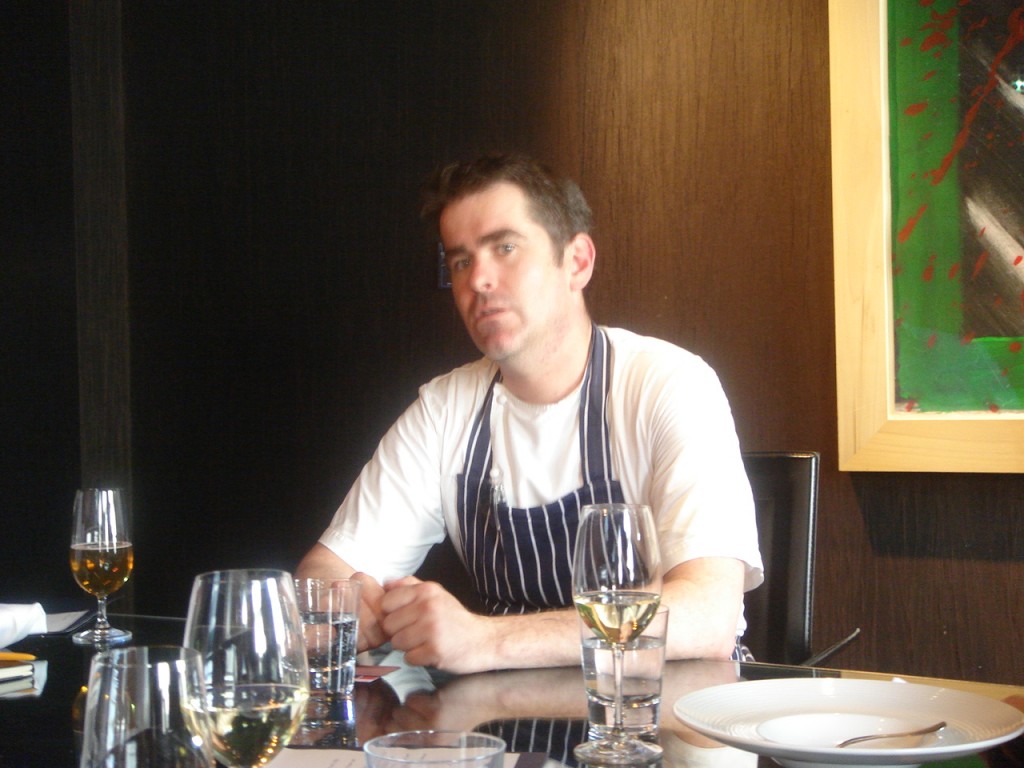
Shane Osbourne
If you are a fish lover such as myself, you probably can’t help but be alarmed by the ‘S’ word – sustainability. A doubling of global fish consumption since 1973 has led to overfishing, leading to some fish species becoming endangered. The Food and Agriculture Organisation of the United Nations estimates that more than half of all fisheries around the world are being overfished. The issue of fish sustainability was further highlighted in the recent release of the film “The End of the Line”. Based on the book of the same name by Charles Clover, a former Daily Telegraph journalist, the documentary argues that unless the fishing industry is regulated, the world will run out of seafood around 2048, which would lead to starvation for 1.2 billion people. Furthermore, it shows that 50% of the cod fished from the North Sea is caught illegally, and that the waters of Newfoundland, once fat with fish, have also almost run out of cod.
But whatever the facts, the subject matter is poignant. Current rates of fishing is unsustainable. It was therefore positive to hear that as a consequence of this film, Pret A Manger and Marks & Spencer have announced that from now on they will only source sustainable tuna. There have also been calls for Nobu to drop the use of the endangered bluefin tuna.
This week I was invited to a lunch prepared by Shane Osbourne of Pied à Terre where an Australian farmed kingfish imported by the Australian company Clean Seas was being featured on the menu. I missed cookery school to go, so there will be no blog post on school this week, but it really wasn’t difficult trying to choose between slaving away in a kitchen and eating a meal prepared by a two star Michelin chef. But more importantly, I was curious to find out more about this product which Clean Seas claim is sustainable.
The kingfish is farmed in an ocean aquaculture facility in South Australia. State-of-the-art marine hatchery equipment and best practice aquaculture methods are used to ensure that there are no detrimental effects on the ocean, and antibiotics and growth hormones are not used. I was also impressed to discover that Clean Seas recently announced a breakthrough in rearing Southern bluefin tuna fingerlings from hatchery eggs, with the first sustainable bluefin tuna expected to be available from 2011.
A question was raised about the environmental impact of flying fish over from Australia. But speaking with Jemma from Clean Seas, it was reassuring to hear that the company is committed to being carbon neutral and reducing emissions. Furthermore, Clean Seas was the first fishing company in the southern hemisphere to be certified ISO 14001. It is also certified as a Sustainable Seafood Provider by Friends of the Sea.
These issues covered, it was time to eat. Shane cooked up a delicious kingfish menu which was as follows:
Home smoked kingfish with celery truffle butter emulsion & pickled radishes
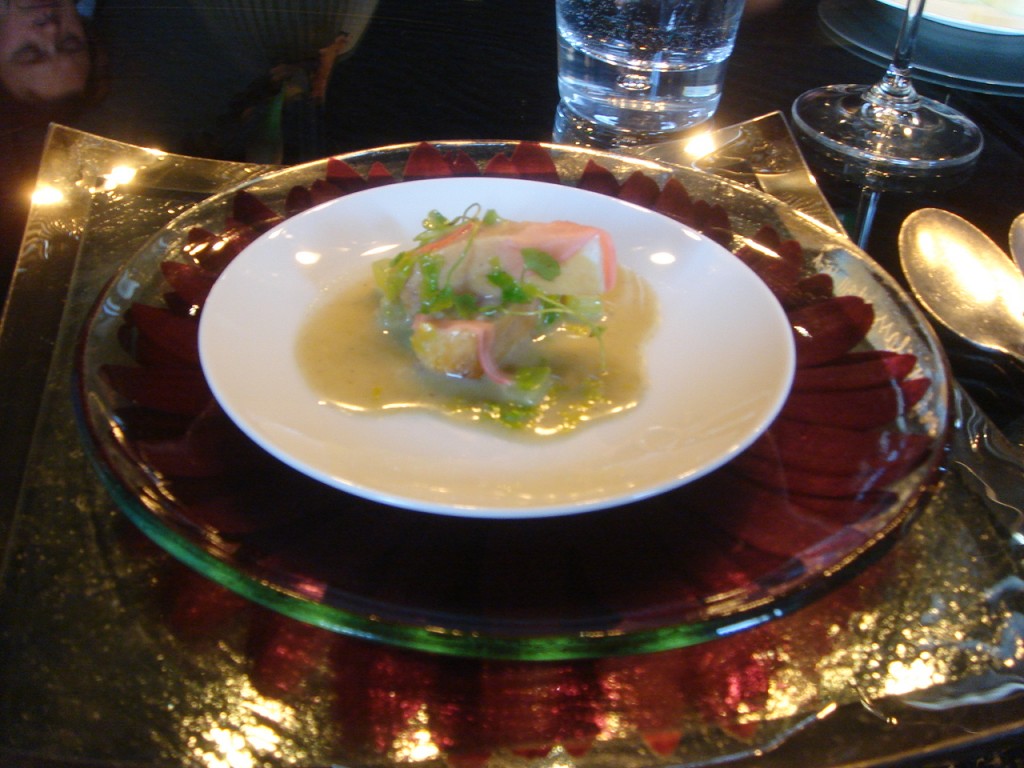
Tartare of kingfish with green beans, parsley and pommery mustard mayonnaise
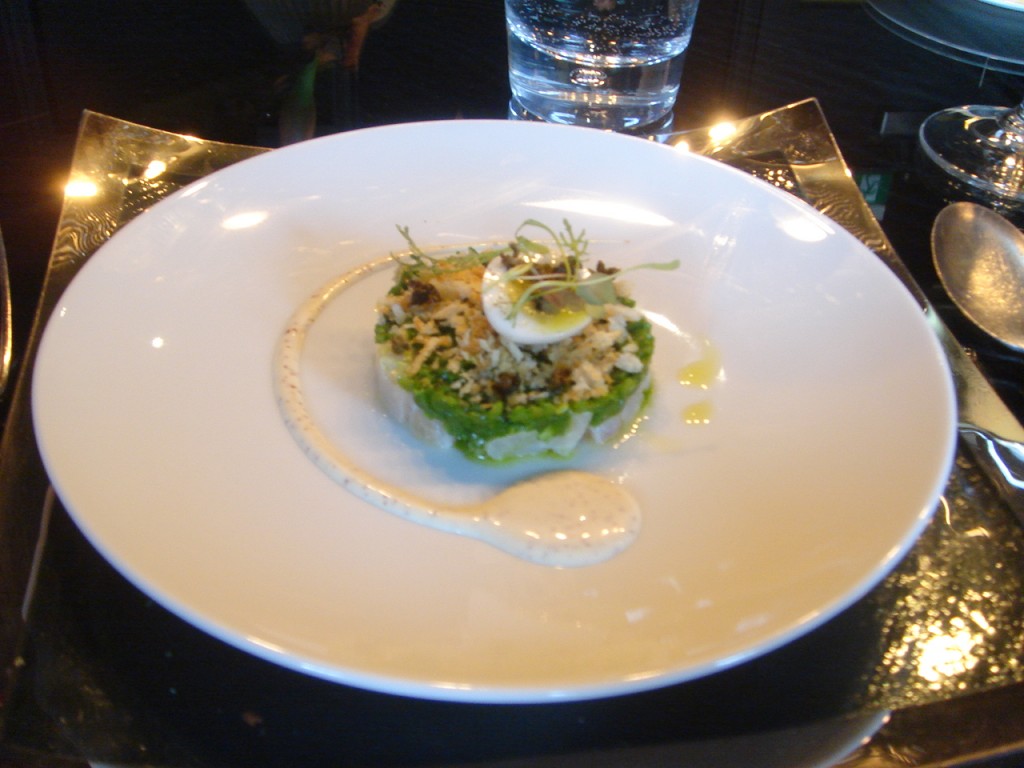
Ceviche of kingfish with carrot and verjus, avocado crème fraiche & sunflower seeds (I recently featured a verjus custard recipe by Maggie Beer)
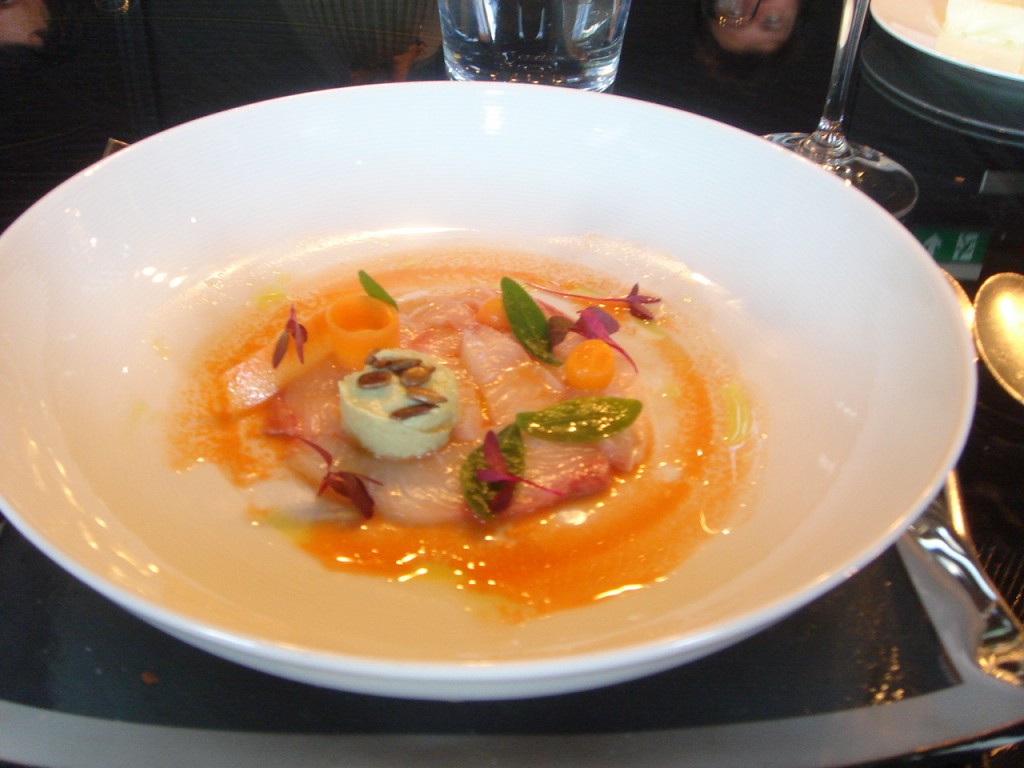
Slow poached kingfish with asparagus and a grapefruit emulsion
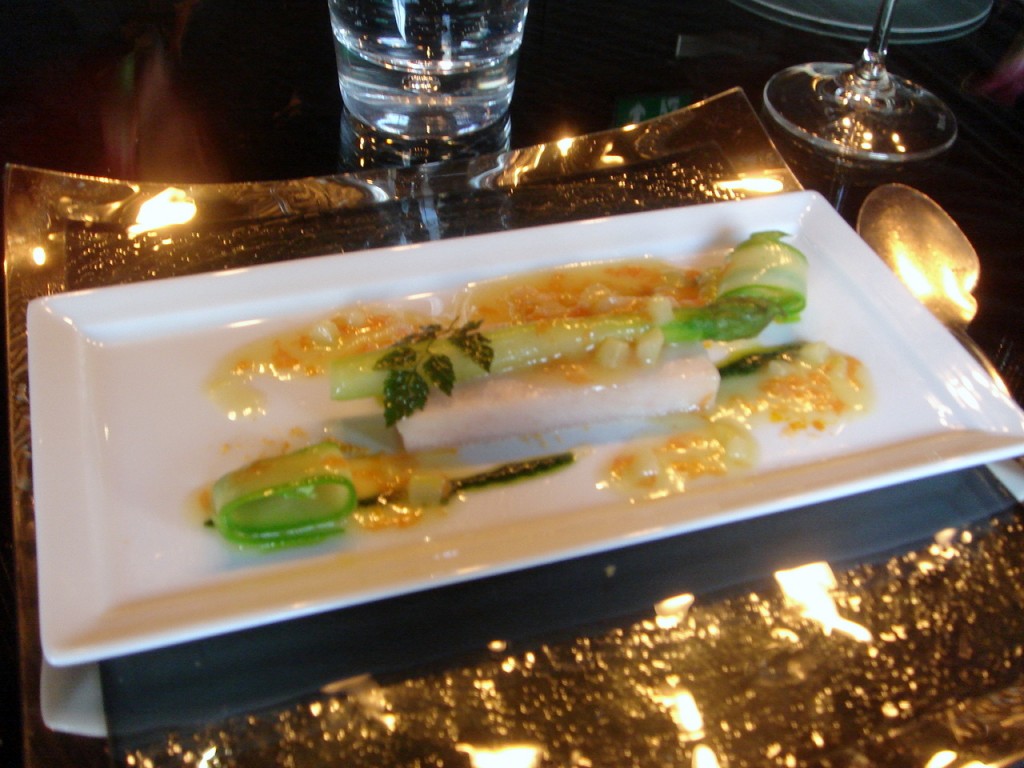
Pan-fried kingfish with courgette and basil cream, squid and saffron dressing
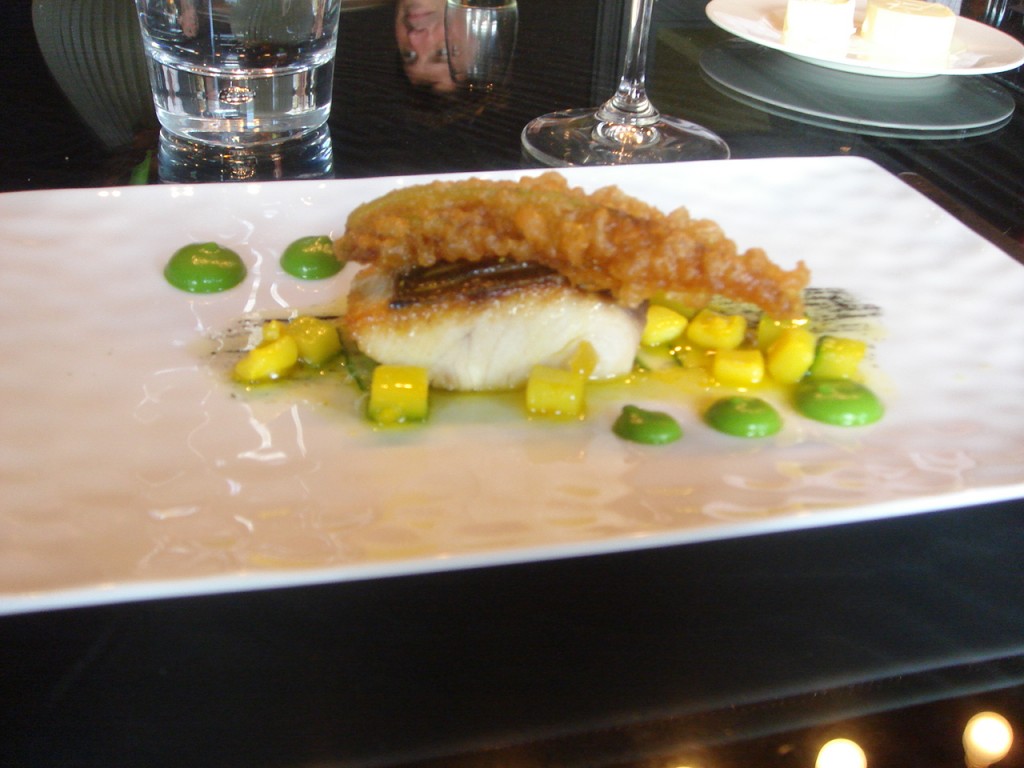
Raspberries with fromage frais and lemon verbena
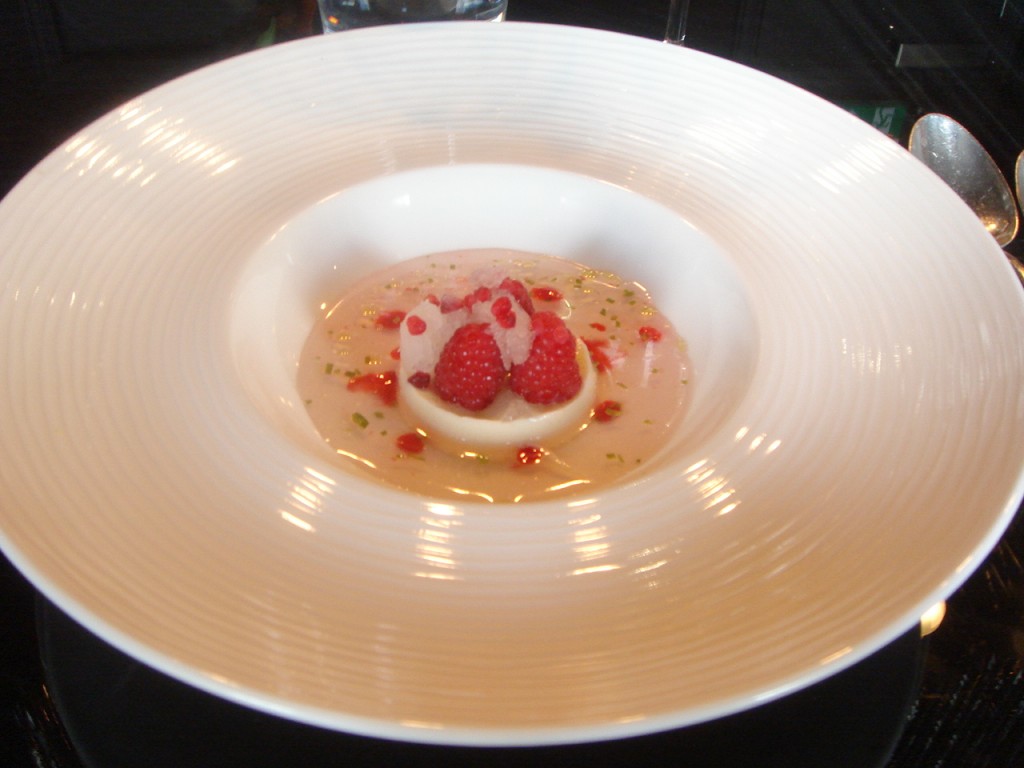
This isn’t a restaurant review so I won’t comment on the specifics of the food other than to say it was delicious, with the fish being extremely tasty. Kingfish has a light subtle flavour, like a delicate white meat. It is probably more commonly referred to as just yellowtail and I have often eaten it as either sashimi or sushi, but rarely in a cooked form. Therefore, it was interesting to see how diverse the uses for it are: smoked, tartare, ceviche, slow poached (Shane poached it at 46c for 9 minutes) and pan-fried.
At the end of the meal, Shane came out to chat to us to explain why he is endorsing this fish. Being Australian, he has often been asked to support various Australian products, but cooking in Britain means he tends to advocate the use of British produce. But having visited the fish farm, he was ‘blown away’ by it and he now uses the Clean Seas kingfish at both Pied à Terre and its sister restaurant L’Autre Pied. (Co-incidentally, Shane was a really nice guy – so easy going and fun to chat to. I’ve eaten at Pied à Terre before and admired him for the fact that he was the first Australian chef to win a Michelin star, so it was nice to discover that he’s really down to earth).
But back to the issue of sustainability: fishing is ultimately driven by demand. Therefore, as consumers we can effect a change, no matter how small, in the world’s fish supplies by making sustainable choices in terms what we buy to cook at home and what we order in a restaurant. And with this write-up, you have some information on another sustainable fish source. The choice is now yours.
Clean Seas kingfish is available from Selfridges.
Pied à Terre at:
34 Charlotte Street
London W1T 2NH
Tel: +44 (0)20 76361178
July 3rd, 2009 at 4:00 pm
Informative, thank you!
It’s good that Clean Seas are carbon neutral but a part of me can’t help but think it would be better to encourage such projects closer to home over importing from the opposite side of the world, even with carbon offsetting!
But, it sounds like they are leaders in their field, so perhaps their success will encourage others.
July 4th, 2009 at 9:23 am
Hi Kavey, I can understand the thought process being thinking that shipping food from Australia, even with carbon offsetting, isn’t environmentally friendly. But I think Clean Seas are trying to do the right thing, and at the end of the day the real message I am trying to get across is that we need to consider eating sustainably.
July 4th, 2009 at 1:02 pm
I would have given blood to have been there, having sampled his ceviche from the Australian menu at Selfridge’s.
July 4th, 2009 at 1:24 pm
Hi Douglas, yes Shane is a fabulous cook. And so nice!
July 4th, 2009 at 9:32 pm
I think it was the carrot kingfish I tried at Taste of London, and I remember it being delicious! Knowing it’s from a sustainable source further sweetens the deal 🙂
July 5th, 2009 at 3:20 pm
Hi Canelvr, yes Shane did mention cooking kingfish at the taste of London.
July 8th, 2009 at 7:19 pm
The whole sustainability thing is the buzz thing right now. Here are my two cents (and warning some of what I say is going to be very controversial).
1) I am all for sustainability but the substitute has to taste just as good (or better). If I am going to pay crazy money at a top end restaurant, I don’t want restaurants giving me 2nd rate stuff when it can be made with better. I think this point really struck me with the whole ‘blue-fin tuna’ issue which is a hot topic right now. I don’t think any serious diner can look me in the face and tell me seriously that there is no difference between blue-fin tuna and its inferior counterpart, the yellow fin. Similarly, if I am visiting a michelin starred restaurant, I don’t want pollock or gurnard to be shoved in my face when cod is available.
2) But by supporting these restaurants you are contributing to extinction bla bla bla bla… How much does the fine dining sector really contribute to the consumption of these rare fish? 10%? 5%? 1%? On the other hand, you have supermarkets like Tesco’s and Asda who do pretty much nothing (or very little) in fish conservation. Now how much of a role do they have in fish conservation?
3) But an inferior fish allows the chef to show his true qualities you say? Well… that is true to a certain extent, but you cannot make 1st rate food with 2nd rate ingredients. Aquitaine caviar will never ever come close to beluga gold caviar. Farmed salmon, no matter how well it is looked after is a pale shadow of wild salmon.
So in summary, I am all for sustainability as long as the dish I am eating CANNOT be improved with a different fish.
July 11th, 2009 at 7:31 pm
Great post. End of the Line was also a great film – I was lucky to view the movie in London with Charles Clover who answered questions after the film.
In response to gen.u.ine.ness – I think with fish that are on the verge of extinction, like bluefin, its best to refrain from eating and not try to find a replacement. Bluefin will most likely be extinct within our lifetimes and much is caught illegally and in excess of quotas set by the EU (which many argue are still too high). I’m with you on farmed fish – it’s actually often more unsustainable than wild, except for mollusks.
It’s also important to consider the effects of unsustainable fishing – like for 1 pound of shrimp caught by trawlers, 10 pounds of by-catch is dumped. That’s 10 pounds of fish that could have been eaten that is thrown back into the ocean dead or dying.
July 15th, 2009 at 5:04 pm
Hi all, Clean Seas is confident that our farmed yellowtail kingfish will stand up to comparison taste-wise with any wild alternative, in fact, we believe it is one of the finest-tasting white fish on the market, regardless of whether farmed or wild. Gone are the days where farmed fish automatically indicates an inferior quality/taste – as aquaculture has developed, many different type of fish farms with different policies and environmental positions have emerged. We sincerely strive to be leaders in best practice, aware of and acting positively upon the issues surrounding fish farming & wild stocks, and constantly evolving to be more sustainable throughout the supply chain, and care for the environment. Our Friends of the Sea certification is one critical indicator of this goal. And on the bluefin tuna… , through our ongoing R&D projects, we expect to offer the first sustainably farmed Southern Bluefin Tuna in coming years, meeting demand for this amazing fish whilst caring for the oceans and letting indigeneous BFT stocks revive. You can try our Yellowtail Kingfish yourself – available at Applebees Borough Market (Stony St) and Selfridges Food Hall. Thanks for all the comments. Cheers